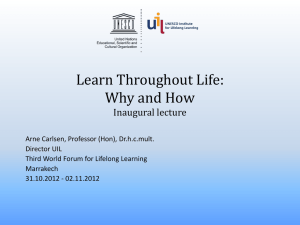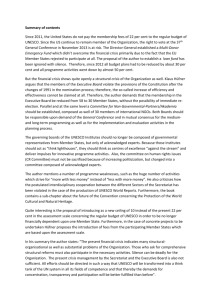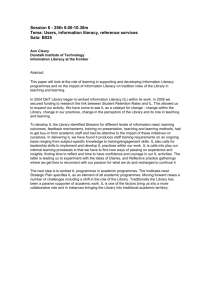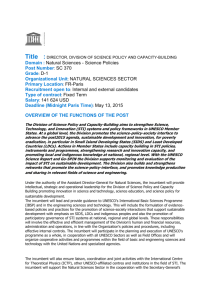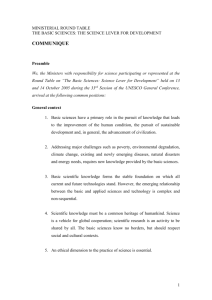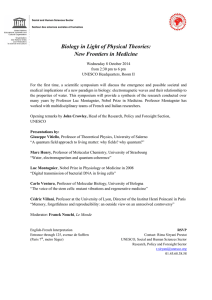Understanding Life Skills
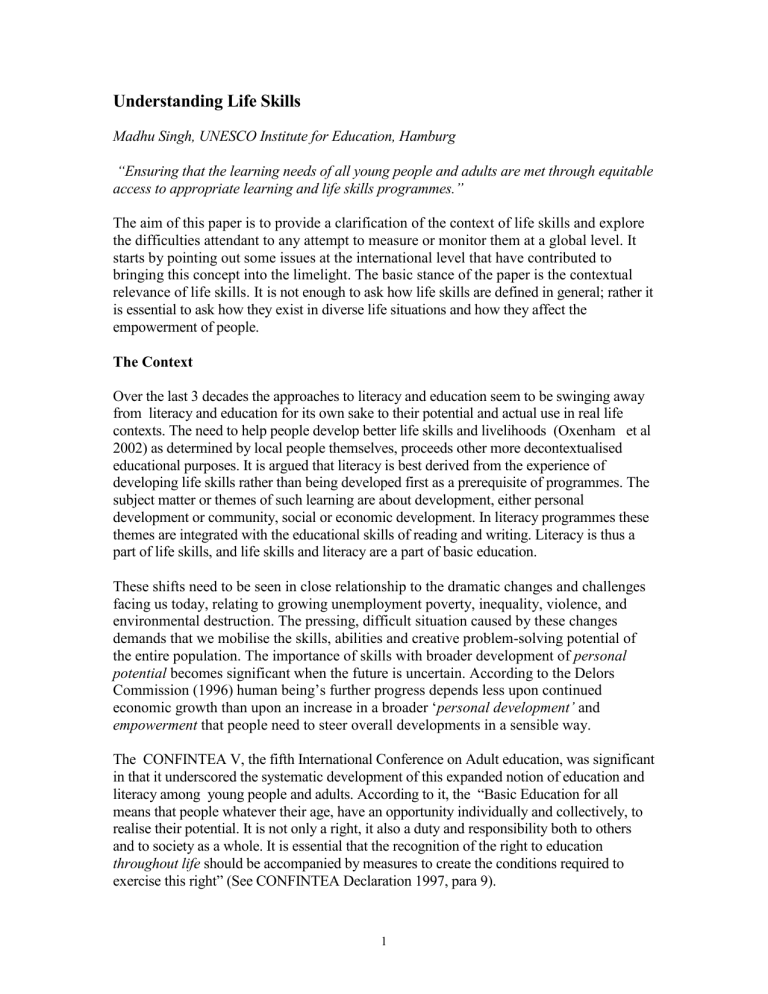
Understanding Life Skills
Madhu Singh, UNESCO Institute for Education, Hamburg
“Ensuring that the learning needs of all young people and adults are met through equitable access to appropriate learning and life skills programmes.”
The aim of this paper is to provide a clarification of the context of life skills and explore the difficulties attendant to any attempt to measure or monitor them at a global level. It starts by pointing out some issues at the international level that have contributed to bringing this concept into the limelight. The basic stance of the paper is the contextual relevance of life skills. It is not enough to ask how life skills are defined in general; rather it is essential to ask how they exist in diverse life situations and how they affect the empowerment of people.
The Context
Over the last 3 decades the approaches to literacy and education seem to be swinging away from literacy and education for its own sake to their potential and actual use in real life contexts. The need to help people develop better life skills and livelihoods (Oxenham et al
2002) as determined by local people themselves, proceeds other more decontextualised educational purposes. It is argued that literacy is best derived from the experience of developing life skills rather than being developed first as a prerequisite of programmes. The subject matter or themes of such learning are about development, either personal development or community, social or economic development. In literacy programmes these themes are integrated with the educational skills of reading and writing. Literacy is thus a part of life skills, and life skills and literacy are a part of basic education.
These shifts need to be seen in close relationship to the dramatic changes and challenges facing us today, relating to growing unemployment poverty, inequality, violence, and environmental destruction. The pressing, difficult situation caused by these changes demands that we mobilise the skills, abilities and creative problem-solving potential of the entire population. The importance of skills with broader development of personal potential becomes significant when the future is uncertain. According to the Delors
Commission (1996) human being’s further progress depends less upon continued economic growth than upon an increase in a broader ‘ personal development’
and empowerment that people need to steer overall developments in a sensible way.
The CONFINTEA V, the fifth International Conference on Adult education, was significant in that it underscored the systematic development of this expanded notion of education and literacy among young people and adults. According to it, the “Basic Education for all means that people whatever their age, have an opportunity individually and collectively, to realise their potential. It is not only a right, it also a duty and responsibility both to others and to society as a whole. It is essential that the recognition of the right to education throughout life should be accompanied by measures to create the conditions required to exercise this right” (See CONFINTEA Declaration 1997, para 9).
1
According to the report of CONFINTEA V, 'the objectives of youth and adult education are: a) to develop the autonomy and the sense of responsibility of people and communities; b) to reinforce the capacity to deal with the transformations taking place in the economy, in culture and in society as a whole, and c) to promote coexistence , tolerance and the informed and creative participation of citizens in their communities, in short to enable people and communities to take control of their destiny and society in order to face the challenges ahead' (See Hamburg Declaration 1997, para 5 ).
Definition of life skills
There are many different understandings of life skills but no definition is universally accepted. Different organisations attach different meanings to the term. The International
Bureau of Education (IBE) derives its understanding from the Delors four pillars of learning - learning to know, learning to do, learning to be and learning to live together - and defines life skills as personal management and social skills which are necessary for adequate functioning on an independent basis. (See: http://www.ibe.unesco.org/international/DocServices/Thesaurus/00003739.htm) .
UNICEF has defined life skills as psychosocial and interpersonal skills that are generally considered important. The choice of, and emphasis on, different skills will vary according to the topic. For example decision making may feature strongly in HIV/AIDs prevention whereas conflict management may be more prominent in a peace education programme.
According to UNICEF it is ultimately the interrelations between the skills that produces powerful behavioural outcomes, especially where this approach is supported by other strategies such as media, policies and health services
(See: http://www.unicef.org…me/lifeskills/whatwhy/skills.html
)
The Mental Health Promotion and Policy (MHP) team in World Health Organistion’s
(WHO) Department of Mental Health has produced this definition of life skills: “Life skills education is designed to facilitate the practice and reinforcement of psychosocial skills in a culturally and developmentally appropriate way; it contributes to the promotion of personal and social development, the prevention of health and social problems, and the protection of human rights”. (WHO 1999)
It is evident that in addition to practical and vocational skills, other types of skills such as social, individual and reflective skills are also needed. Life skills programmes emphasise abilities that help to facilitate communication, negotiation, to think critically and solve problems and make independent decisions. These developments in the field have in fact resulted in important breakthroughs in policy and planning, especially in non-formal education programmes for marginalised and disadvantaged youth and adults (see UNESCO,
New Delhi 2001). In many parts of the world, life skills form a significant and regular part of the school and adult curriculum.
However critical gaps remain. A greater emphasis still needs to be put on the sociopsychological development of the learners. Values that need to be reinforced include
2
democracy, egalitarianism, social justice, rule of law, learning to live together, secularism, peace, non-violence, for self image and self-confidence and respect for others and the like.
(Daswani 2002)
The OECD has adopted a more generic definition of life skills in the context of the
DeSeCo project (Rychaen and Salganik 2001). It defines life skills on three general criteria, namely that a) key competencies contribute to an overall successful life and a well-functioning society, b) they are instrumental to meeting important challenges in a wide spectrum of relevant contexts, and finally, c) they are relevant to all individuals.
These key competencies are: a) functioning in socially heterogeneous groups, b) acting autonomously and c) using tools interactively.
Life skills defined in a general way mean a mix of knowledge, behaviour, attitudes and values and designate the possession of some skill and know-how to do something, or reach an aim. They include competencies such as critical thinking, creativity, ability to organise, social and communication skills, adaptability, problem solving, ability to cooperate on a democratic basis that are needed for actively shaping a peaceful future. A number of such lists exist which show a high degree of correspondence, though few lists are in complete agreement.
The constituents of generally defined life skills can be described in the following way: a) they include the abilities necessary to apply the conceptual thinking and reflection in concrete situations; b) they imply capacities to be involved in effective interaction with the environment and provide an appropriate motivational attitude; c) they involve psychological prerequisites for successful performance, such as problem solving capacities, selfconfidence and skills for critical thinking (Dohmen 1996).
In many of the generic definitions of life skills in particular those that are developed in the northern context the individual and workplace dimensions are slightly overweighing the other skills such as social and citizen skills, in spite of the clear acknowledgement of the importance attached to both dimensions (Ouane 2002). The generic understanding of life skills from the dual angle of personal fulfillment and realisation of social responsibility includes both empowerment and self-fulfilment and the capacity to be a part of a heterogeneous group and strive for common goals. They can also imply success in personal and professional life. Seen from a social point of view they can mean cohesion, happiness, well being and good functioning of a group, as well as success in relating to others and living together. The idea of success is not only the accomplishment of a happy working life, but also the creation of a self-fulfilling life outside the world of work and wealth creation.
(Ouane 2002).
Why life skills
It is not enough to ask how life skills are defined in general; rather it is essential to ask how they are defined in particular life situations and through out life (Ouane 2002; Goody 2001).
Life skills are developed as a result of a constructive processing of information, impressions, encounters and experiences, - both individual and social - that are a part of one’s daily life and work
and the rapid changes that occur in the course of one’s life.
The
3
social dimensions are particularly important as they condition life itself and compel individuals to purposefully acquire skills, develop attitudes and values in order to face and master real life situations (Ouane 2002).
Activities over the life course take place in a variety of contexts (political process, work place, at home, in the community, or in non-formal and informal settings), and sectors or domains (health, environment, gender, work etc.) of human existence. Therefore, it is in the context of these different life situations that life skills need to be adapted and defined.
Implications for monitoring learning opportunities
Life skills learning need not be confined to a specific age or stage in life . The idea of understanding life skills from a lifelong learning rests upon integrating learning and living both horizontally across family, community, study, work, leisure, and ‘life spaces’ and vertically from birth to death. Lifelong or in this case ‘life skills learning’ is reflected in the knowledge, experience, wisdom, harmony and self-realisation rooted in the practical affairs of ordinary men and women (Yeaxley 1929:165 quoted in Ouane 2002).
From Faure Report (1972) to the Delors Report (1996), it has been recognised that lifelong learning is integral to a meaningful human life.
In the future every educational endeavour will have to ask itself whether and to what extent it promotes learning activities that help develop life skills that are vital to coping with the key issues of one’s life and survival, and to what extent it stimulates requisite attitudes and motivations (curiosity, interest, self-starting qualities) for lifelong learning.
Learning to learn is itself is a basic need, one could say a life skill. In the Jomtien
Declaration of The World Conference on Education for All (WCEFA) “basic learning needs comprise both essential learning tools (such as literacy , oral expression, numeracy and problem solving) and basic learning content ( such as knowledge, skills, values and attitudes) required by human beings to be able to survive, to develop their full capacities, to live and work in dignity, to participate fully in development, to improve the quality of their lives, to make informed decisions , and to continue learning.
The critique on formal education is that it has concentrated too much on the instrumental and vocational skills and on the cognitive dimension (literacies) rather than on other dimensions such as the reflective and the psychosocial dimensions. On the other hand researches have shown that life skills can be systematically acquired and reinforced through non-formal and informal learning settings . Such learning occurs in families, communities, organisations and associations, the workplace and through the media. They focus attention on people’s empowerment and on values and attitudes such as promoting a better understanding between individuals, active participation and the capacity to negotiate, to live together, and to develop critical thinking. Life skills lerning need to be included in curricula and not delivered as separate, stand-alone programmes except where conditions may require.
Life skills cannot be learned in an abstract and theoretical way. Rather it requires the individual to subject his own experience, contexts and observations about problems to
4
creative analysis and evaluation, to collect, probe and discuss his experience where it happens in real life.
Life skills are in constant evolution both in terms of individual’s personal as well as the economic, social and cultural contexts.
Given the diversity of contexts, backgrounds and cultures and inherent abilities there are bound to be individuals and groups, who cannot attain some life skills. So one has to encourage alternative skills (Goody 2001). One needs to try and develop other skills and abilities to encourage diversity rather than uniformity.
Measuring life skills
Although it is desirable to assess the acquisition of life skills by measuring them as far as possible, it is obvious that not everything and not all life skills can be easily submitted to measurement , particularly as methodologies and tools are not available nor adequately developed for the purpose.
The only way to assess life skills is through appropriate proxies. An interesting study in
South Africa (Albertyn, Kapp and Groenewald 2001) has shown the effects of local life skills training programmes to empower workers. Empowerment patterns show shifts from micro-level personal issues to more external issues and growth in terms of their critical thinking ability and action . Workers showed a more positive outlook on life, had greater feelings of confidence and self-respect, and a heightened feeling of control over life circumstances. There were shifts in the patterns of empowerment as individuals move from being preoccupied with themselves as they focused on micro-level issues on a focus on more external issues . Discovering the patterns of empowerment through the course of a life-skills programmes could provide valuable information on the notions of life skills to gain understanding regarding the experiences of participants and in so doing to continually improve the practice of adult education
Life skills need to be assessed not only by adding up individual achievements measured by changes in behaviour, but rather result from holistic indicators which take into account values such as : a) living together; b) respect and tolerance of differences and diversity; c) active participation in community, group, work and social life; d) living and working in dignity; e) making informed decisions.
Life skills are not static skills, but evolve according to circumstances. Life skills depend also upon the family milieu and upon gender difference. The measurement of life skills should be able to take into account disparities in social background, gender and the labour market, as well as national and international cultural variations .
All life skills have only a contextual relevance both within and across societies. It is important not to forget the contextuality of life skills, because this is the main reason for the success of life skills learning. Life skills need to be adapted to the specific contexts of
5
each country, each group or even each individual. Very often the generic and derivational definition will conflict with an inductive search of the same competencies in the real situation.
To transfer requirements of universally required key qualifications and key competencies, which have been defined in the context of the North, to the developing countries with very different socio-economic situations is to pose problems and to distort the whole emphasis of their education in other functionally necessary life skills. It would also create further divisions between the North and South, rather than resolving them.
It is recommended that researchers and statisticians place more emphasis on the development of conceptual definitions and matrix to assess/monitor better this EFA goal.
References
Daswani, C. J (2002) Evolution of Adult Learning Programmes in the Asian Region. In:
UIE, Institutionalising Lifelong Learning: creating conducive environments for adult
Learning in the Asian Context, edited by Madhu Singh, UNESCO Institute for
Education.
Delors, J. (1996) Learning: The Treasure Within , Report to UNESCO of the International
Commission on Education for the Twenty-First Century, Paris, UNESCO Publishing
Press.
Dohmen, G. (1996) Lifelong Learning: Guidelines for a Modern Education Policy.
Bmb+f. Bundesministerium für Bildung, Wissenschaft, Forschung und Technologie.
Faure, E. (1972) Learning to be , Paris, UNESCO.
Goody, J. (2001) Competencies and Education: Contextual Diversity . In: Rychen, D.S,
Salganik L.H. (eds.) (2001) Defining and Selecting Key Competencies
, Göttingen,
Hogrefe and Huber Publications.
Longworth, Norman (2001) ‘Learning Communities for a Learning Century' in
International Handbook of Lifelong Learning, Part II, The Netherlands, Academic
Publishers.
Ouane, A (2002) Key competencies In Lifelong Learning. Institutionalising lifelong learning: Creating Conducive Environments for Adult Learning in the Asian Context ,
UNESCO Institute for Education, Hamburg.
Ravens, J Van: Understanding Goal 3, unpublished manuscript .
Rychen, D.S, Salganik L.H. (eds.) (2001) Defining and Selecting Key Competencies ,
Göttingen, Hogrefe and Huber Publications.
UNESCO-UIE (1997) Fifth International Conference on Adult Education, Final Report ,
Paris, UNESCO.
UNESCO and the Indian National Commission for Co-operation with UNESCO (2001)
Life Skills in Non-formal Education: A Review
UNESCO Education Sector 2003 Strengthening the links between EFA and Skills
Development for Employability and Effective Citizenship. The Skills Development
Dimension of the Dakar Framework on Education for All.
WHO, (1999 ) Partners in Life Skills Education. Conclusions from a United Nations
Inter-agency Meeting . Geneva, WHO, 1999 ( WHO/MNH/MHP/99.2).
6
World Education Forum (2000) Education for All - The Dakar Framework for Action.
UNESCO, Paris.
Yeaxley, BA (1929) Lifelong Education , London, Cassel.
7

